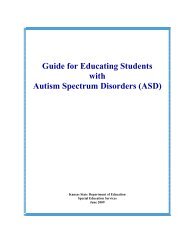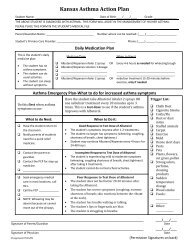People make it happen(PDF)1 - Families Together Inc.
People make it happen(PDF)1 - Families Together Inc.
People make it happen(PDF)1 - Families Together Inc.
Create successful ePaper yourself
Turn your PDF publications into a flip-book with our unique Google optimized e-Paper software.
Many students w<strong>it</strong>h disabil<strong>it</strong>ies<br />
will be continuing<br />
their education after high<br />
school. Postsecondary personnel play<br />
a role in helping students who are<br />
making the trans<strong>it</strong>ion from high school<br />
to vocational/technical schools, junior<br />
and commun<strong>it</strong>y colleges, univers<strong>it</strong>ies,<br />
and other post secondary inst<strong>it</strong>utions.<br />
Students w<strong>it</strong>h disabil<strong>it</strong>ies who are<br />
exploring post-secondary options need<br />
the support of personnel who are<br />
involved in enrollment, recru<strong>it</strong>ment,<br />
and support services. These personnel<br />
must be willing to assist students w<strong>it</strong>h<br />
both school-related issues and adjustment<br />
to campus life.<br />
Specific Roles of<br />
Postsecondary Personnel<br />
Advising and Informing Students<br />
Personnel from postsecondary inst<strong>it</strong>utions advise students<br />
on the types of high school classes they need in<br />
order to be prepared for postsecondary curriculum. In<br />
add<strong>it</strong>ion, they can describe the type of classes a student<br />
might be taking at the postsecondary level and provide<br />
examples of the requirements for those classes.<br />
Personnel from postsecondary inst<strong>it</strong>utions can also provide<br />
information about campus activ<strong>it</strong>ies that are available<br />
to enhance a student’s area of study. Finally, they<br />
can pose questions to the student and the trans<strong>it</strong>ion<br />
team about other issues to consider prior to the student<br />
enrolling in a postsecondary school. Some of these<br />
issues might include transportation, accommodations,<br />
mobil<strong>it</strong>y, housing, fratern<strong>it</strong>ies and soror<strong>it</strong>ies, and other<br />
clubs and organizations.<br />
Providing Accommodations<br />
and Support Services<br />
All postsecondary inst<strong>it</strong>utions have personnel who specialize<br />
in assisting students w<strong>it</strong>h disabil<strong>it</strong>ies. However,<br />
different campuses and programs may specialize in<br />
different disabil<strong>it</strong>y groups. One commun<strong>it</strong>y college<br />
may have an abundance of assistive technology, services,<br />
and resources for students who are deaf or hard of<br />
hearing, while another college may have expertise in<br />
the area of learning disabil<strong>it</strong>ies.<br />
Personnel from the office that works w<strong>it</strong>h students w<strong>it</strong>h<br />
disabil<strong>it</strong>ies can provide information about how accommodations<br />
are made for students. Staff will work w<strong>it</strong>h<br />
each student and family to gather specific information<br />
about the student’s needs. W<strong>it</strong>h this information, the<br />
postsecondary personnel can suggest specific accommodations<br />
that can be made. Some of these accommodations<br />
may be: readers, tutors, notetakers, specialized<br />
computers and computer equipment, lift-buses, books<br />
on tape, and interpreters.<br />
7





